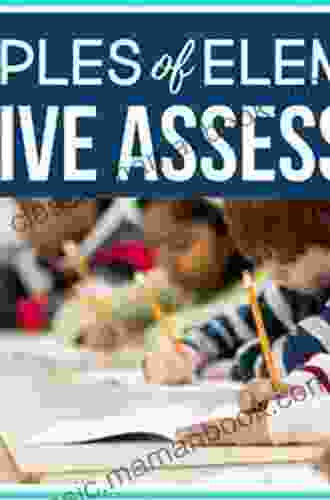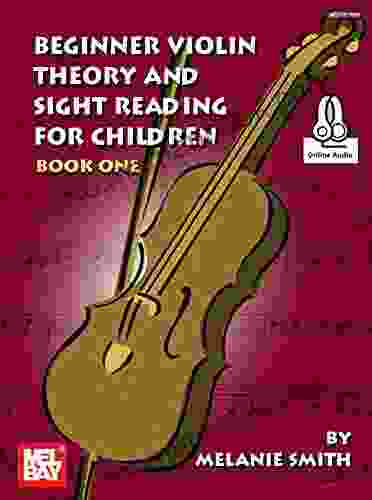Improving Student Achievement Through Formative Assessment: A Comprehensive Guide

5 out of 5
| Language | : | English |
| File size | : | 2241 KB |
| Text-to-Speech | : | Enabled |
| Screen Reader | : | Supported |
| Enhanced typesetting | : | Enabled |
| Word Wise | : | Enabled |
| Print length | : | 194 pages |
In the dynamic landscape of education, formative assessment has emerged as a game-changer in the pursuit of student achievement. This article serves as a comprehensive guide to the transformative power of formative assessment, empowering educators with the knowledge and strategies to harness its potential for academic success.
The Principles of Formative Assessment
Formative assessment is a process of gathering and interpreting information about student progress during instruction. It is designed to provide feedback to both students and teachers, informing instructional decisions and adjustments throughout the learning process. The key principles of formative assessment include:
- Purposeful and Focused: Formative assessments are not simply tests, but rather carefully designed tasks that are aligned with specific learning objectives and provide meaningful insights into student understanding.
- Frequent and Ongoing: Formative assessment is an iterative process that occurs throughout instruction, providing multiple opportunities for students to demonstrate their knowledge and skills.
- Feedback-Driven: The primary goal of formative assessment is to provide timely and actionable feedback that helps students identify areas for improvement and guides their learning.
- Student-Centered: Formative assessment shifts the focus from evaluation to student learning, empowering students to take ownership of their progress.
Benefits of Formative Assessment
Implementing formative assessment practices in the classroom offers numerous benefits for both students and educators. These include:
- Enhanced Student Learning: Formative assessment provides students with ongoing feedback and support, helping them identify areas for improvement and develop effective learning strategies.
- Informed Instructional Decisions: Formative assessment data helps teachers make informed decisions about pacing, instructional strategies, and differentiation, tailoring instruction to meet the specific needs of each student.
- Increased Student Engagement: Formative assessment can foster a classroom culture of learning and growth, where students are actively engaged in the assessment process and motivated to improve.
- Reduced Learning Gaps: By providing early identification of struggling students, formative assessment helps to prevent learning gaps from widening and ensures that all students have the support they need to succeed.
Practical Implementation Strategies
Implementing formative assessment effectively requires careful planning and implementation. Here are some practical strategies to consider:
1. Set Clear Learning Goals
The first step in implementing formative assessment is to establish clear learning goals for each unit or lesson. These goals should be specific, measurable, achievable, relevant, and time-bound (SMART).
2. Design Purposeful Assessment Tasks
Create formative assessments that are aligned with the learning goals and provide meaningful insights into student understanding. These assessments can take various forms, such as quizzes, observations, written responses, and self-assessments.
3. Provide Timely and Actionable Feedback
Feedback is the cornerstone of formative assessment. Feedback should be timely, specific, descriptive, and actionable. Encourage students to reflect on the feedback and develop strategies for improvement.
4. Use a Variety of Assessment Techniques
Employ a diverse range of assessment techniques to gather data from multiple perspectives. This can include teacher observations, student self-assessments, peer assessments, and portfolio-based assessments.
5. Encourage Self-Assessment and Goal Setting
Empower students to take ownership of their learning by fostering self-assessment and goal-setting. Encourage students to reflect on their progress and set achievable goals for improvement.
6. Use Technology to Enhance Formative Assessment
Technology can enhance formative assessment by providing real-time data, automating feedback processes, and facilitating student collaboration. Utilize educational software, online platforms, and other digital tools to support formative assessment practices.
Formative assessment is an indispensable tool for educators seeking to improve student achievement. By embracing the principles, benefits, and practical implementation strategies outlined in this guide, educators can harness the transformative power of formative assessment to foster student learning, inform instructional decisions, and create a dynamic and supportive learning environment for all students.
As the educational landscape continues to evolve, formative assessment will remain a critical component of effective teaching and learning. By investing in formative assessment practices, educators can empower students to reach their full potential and achieve academic success.
References
- Black, P., & Wiliam, D. (1998). Assessment and Classroom Learning. Assessment in Education: Principles, Policy, & Practice, 5(1),7-74.
- Brookhart, S. M. (2013). Formative Assessment and Student Success. Educational Leadership, 70(9),38-43.
- Chappuis, J., & Stiggins, R. J. (2002). Assessment for Learning: A Classroom Guide. Educational Research Service.
- McMillan, J. H. (2004). Formative Classroom Assessment: Theory and Practice. Teachers College Press.
- Wiliam, D., & Leahy, S. (2016). Building Assessment for Learning Systems: From Theory to Practice. Educational Testing Service.
5 out of 5
| Language | : | English |
| File size | : | 2241 KB |
| Text-to-Speech | : | Enabled |
| Screen Reader | : | Supported |
| Enhanced typesetting | : | Enabled |
| Word Wise | : | Enabled |
| Print length | : | 194 pages |
Do you want to contribute by writing guest posts on this blog?
Please contact us and send us a resume of previous articles that you have written.
 Top Book
Top Book Novel
Novel Fiction
Fiction Nonfiction
Nonfiction Literature
Literature Paperback
Paperback Hardcover
Hardcover E-book
E-book Audiobook
Audiobook Bestseller
Bestseller Classic
Classic Mystery
Mystery Thriller
Thriller Romance
Romance Fantasy
Fantasy Science Fiction
Science Fiction Biography
Biography Memoir
Memoir Autobiography
Autobiography Poetry
Poetry Drama
Drama Historical Fiction
Historical Fiction Self-help
Self-help Young Adult
Young Adult Childrens Books
Childrens Books Graphic Novel
Graphic Novel Anthology
Anthology Series
Series Encyclopedia
Encyclopedia Reference
Reference Guidebook
Guidebook Textbook
Textbook Workbook
Workbook Journal
Journal Diary
Diary Manuscript
Manuscript Folio
Folio Pulp Fiction
Pulp Fiction Short Stories
Short Stories Fairy Tales
Fairy Tales Fables
Fables Mythology
Mythology Philosophy
Philosophy Religion
Religion Spirituality
Spirituality Essays
Essays Critique
Critique Commentary
Commentary Glossary
Glossary Bibliography
Bibliography Index
Index Table of Contents
Table of Contents Preface
Preface Introduction
Introduction Foreword
Foreword Afterword
Afterword Appendices
Appendices Annotations
Annotations Footnotes
Footnotes Epilogue
Epilogue Prologue
Prologue Dubu Redice Studio
Dubu Redice Studio Stephany Wallace
Stephany Wallace Scot Danforth
Scot Danforth Armando Feler
Armando Feler Aphra Behn
Aphra Behn Teresa K Miller
Teresa K Miller Arushi Singh
Arushi Singh Val Swisher
Val Swisher Nuala O Connor
Nuala O Connor Michael John Carley
Michael John Carley Tevin Ali
Tevin Ali Ellie Clark
Ellie Clark Diane Anderson
Diane Anderson Casey Michel
Casey Michel Geoffrey C Fuller
Geoffrey C Fuller Sarah Amber
Sarah Amber Thomas Jones
Thomas Jones Tony Bedard
Tony Bedard Robert Bernard Martin
Robert Bernard Martin Brandon Roe
Brandon Roe
Light bulbAdvertise smarter! Our strategic ad space ensures maximum exposure. Reserve your spot today!

 Felipe BlairSummer Tote Crochet Shopping Bag Pattern: A Beginner's Guide to a Stylish and...
Felipe BlairSummer Tote Crochet Shopping Bag Pattern: A Beginner's Guide to a Stylish and... Dean CoxFollow ·12.7k
Dean CoxFollow ·12.7k W. Somerset MaughamFollow ·6.8k
W. Somerset MaughamFollow ·6.8k Morris CarterFollow ·2.7k
Morris CarterFollow ·2.7k Cody RussellFollow ·19.5k
Cody RussellFollow ·19.5k Kenneth ParkerFollow ·8.4k
Kenneth ParkerFollow ·8.4k Ernest J. GainesFollow ·3.4k
Ernest J. GainesFollow ·3.4k H.G. WellsFollow ·18.6k
H.G. WellsFollow ·18.6k Nathaniel PowellFollow ·11.6k
Nathaniel PowellFollow ·11.6k
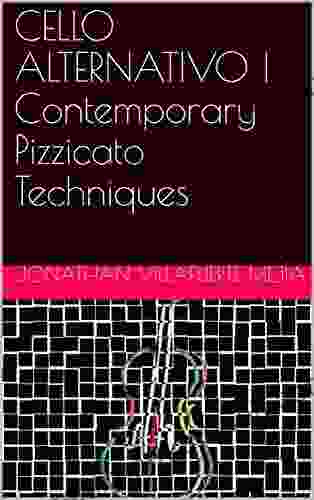
 Bryan Gray
Bryan GrayCello Alternativo: Exploring Contemporary Pizzicato...
: Embracing the Avant-Garde Within...
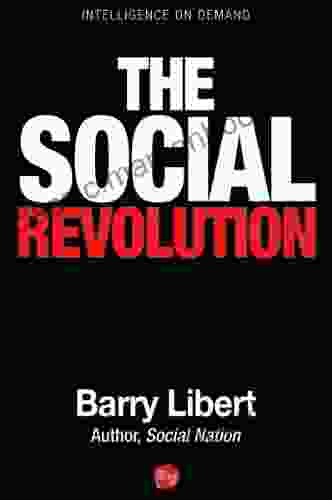
 Victor Hugo
Victor HugoThe Social Revolution: Barry Libert's Vision for a More...
In a world where...
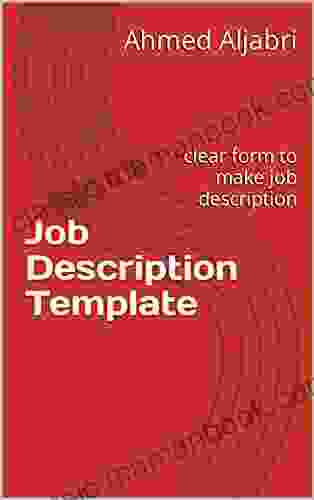
 Tony Carter
Tony CarterA Comprehensive Guide to Crafting Clear and Effective Job...
A job description is a critical tool...

 Deacon Bell
Deacon BellSelected Poems And Prose Lorenzo Da Ponte Italian Library
Lorenzo Da Ponte, born...

 Francisco Cox
Francisco CoxWhat You Need To Know About Opportunity Cost: A...
Opportunity cost is a fundamental concept...
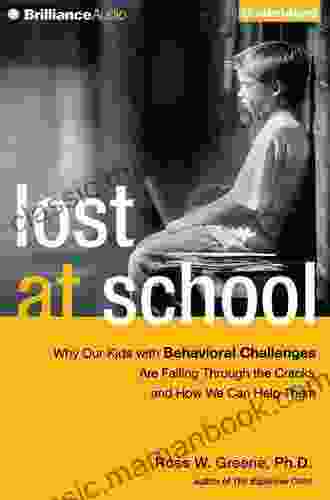
 Bill Grant
Bill GrantWhy Our Kids With Behavioral Challenges Are Falling...
Every year,...
5 out of 5
| Language | : | English |
| File size | : | 2241 KB |
| Text-to-Speech | : | Enabled |
| Screen Reader | : | Supported |
| Enhanced typesetting | : | Enabled |
| Word Wise | : | Enabled |
| Print length | : | 194 pages |


